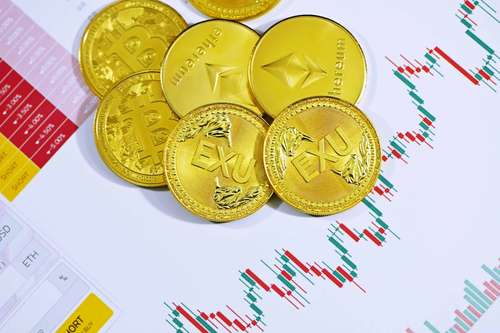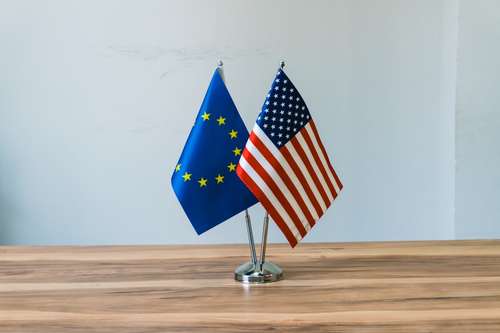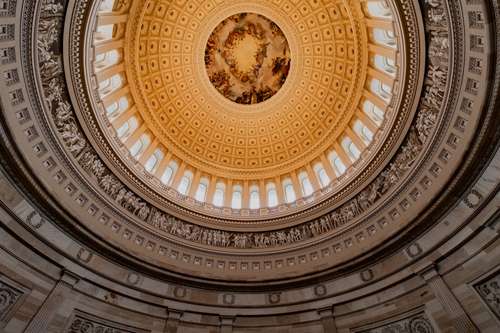Donald Trump’s leap into the cryptocurrency world has grabbed attention across industries. This, in part, can be tied to his past disdain for digital assets. In the past, Trump denounced Bitcoin as “highly volatile and based on thin air.” He previously praised the U.S. dollar as the only "real" currency and dismissed blockchain technology as a scam.
However, his perspective drastically changed by 2024. After meeting prominent crypto entrepreneurs, Trump began leveraging Bitcoin at events, including paying for a meal with it following a New York rally.
While crypto is often seen as a tool for innovation and decentralization, Trump’s involvement raises big questions. Critics worry about potential conflicts of interest, especially as he prepares to enter into office as the US president-elect.
Here, we’ll explore Trump crypto ventures, the associated conflicts of interest, and their implications for the cryptocurrency industry.
What Are Trump Crypto Ventures?

Trump crypto sneakers | Ebay
Donald Trump’s entry into the crypto space is led by World Liberty Financial (WLFI), a blockchain-powered ecosystem introduced in early 2024. WLFI allows users to participate in decentralized finance (DeFi) services like lending, borrowing, and governance through its flagship token, WLFI. The project claims to prioritize transparency and efficiency by using cryptocurrency to address inefficiencies in legacy financial systems.
The WLFI token, unlike traditional cryptocurrencies such as Bitcoin, is designed with specific limitations. It is non-transferable, meaning it cannot be traded on typical exchanges, and is primarily targeted at accredited investors with a net worth exceeding $1 million.
Early sales of the token raised $220 million within its first hour, although subsequent uptake slowed significantly, with only 4.32% of tokens sold within days.
Trump-Branded NFTs
Aside from World Liberty Financial (WLFI), Donald Trump has entered into the non-fungible token (NFT) market with remarkable success. His NFT ventures have included a series of digital trading card collections, which have collectively generated millions of dollars in revenue.
Trump launched his first NFT collection in December 2022, selling out quickly and earning significant attention. These digital cards depicted Trump in various costumes and heroic poses, reflecting his larger-than-life persona.
Since then, he has released multiple additional collections, including the fourth series, “The America First Collection,” launched in August 2024. This latest release generated over $2 million within a few days of sales, though it represents only 6% of the collection’s potential supply. Each NFT was initially priced at $99.
As of 2024, Trump has earned over $7 million from his NFT ventures. The collections are hosted on the Polygon blockchain, emphasizing efficient and cost-effective transactions.
Other Crypto Ventures
Additionally, Trump reportedly owns a portfolio of digital assets worth over $5 million, including Ethereum, Wrapped Ethereum, and his signature MAGA meme coin. Other holdings include tokens like TROG and GUA, which have seen fluctuating market performance since his re-election.
Conflicts of Interest in Politics and Cryptocurrency
Critics worry about potential conflicts of interest, especially as Trump has emerged president again. Many are asking: Is this about supporting crypto or pushing a personal financial agenda? Either way, Trump’s entry into this space is changing the conversation, drawing skeptics and regulators into the mix.
Ethical Concerns Around WLFI
Trump’s deep involvement in WLFI has raised alarm bells among watchdogs, who highlight potential ethical violations. Critics argue that, as Trump returns to the White House, his private financial ventures could create unprecedented conflicts of interest.
Notably, WLFI's governance structure gives significant control to Trump’s family while limiting economic participation for most token holders. This exclusivity might be a veiled effort to consolidate wealth among elites while bypassing transparency norms.
Unclear Financial Transparency
While WLFI claims to promote transparency through blockchain technology, its own financial operations are shrouded in ambiguity. Details regarding its investors and profit-sharing models remain undisclosed, so many have concerns about whether Trump’s presidency will directly enrich his ventures.
Potential Foreign Interference
Another pressing concern is whether WLFI could facilitate foreign influence. Critics warn that governments and foreign entities could exploit Trump’s crypto platforms for political leverage or monetary gains, undermining constitutional safeguards. Skeptics also point out the venture’s heavy marketing to international audiences, raising red flags about compliance with U.S. election finance laws.
Using Crypto as a Political Tool
Trump crypto ventures are tightly intertwined with his political messaging. These platforms not only generate revenue but also encourage his supporters to engage financially with his brand and campaign. For example, WLFI tokens, which offer governance rights on the platform, are marketed as a means for supporters to help shape the future of finance.
Critics argue that such framing ties the financial value of these assets to Trump’s political influence, creating a feedback loop that leverages his public office for private financial gain.
The issue of foreign access to Trump’s crypto platforms further complicates matters. WLFI, in particular, markets its tokens internationally, which raises ethical and legal questions about whether foreign entities could gain undue influence.
Impacts on the Cryptocurrency Industry

Featured | Shutterstock
Trump crypto ventures also have impacts on the cryptocurrency industry, both positive and negative. Let's see some of them below.
1. Increased Public Awareness and Adoption
Trump’s high-profile entrance into the crypto world undeniably elevates its visibility. As the president-elect, his endorsement lends blockchain technology significant mainstream credibility.
2. A Double-edged Sword for the Cryptocurrency Industry Growth
Despite its potential to attract new users, Trump’s venture could tarnish the crypto industry’s reputation. Critics argue that WLFI’s perceived elitism and lack of transparency contradict the decentralized ethos of blockchain. Industry experts warn that ventures like WLFI might reinforce public skepticism about crypto’s legitimacy.
3. Regulatory Implications
Trump crypto ventures also come at a time when regulators are increasingly scrutinizing blockchain projects. If WLFI or similar initiatives face legal challenges, the fallout could set precedents that tighten restrictions on the entire crypto ecosystem. Furthermore, Trump’s history of contentious business practices may invite additional regulatory scrutiny, posing risks to cryptocurrency industry growth.
The Bottom Line
Trump’s expanding footprint in cryptocurrency presents both opportunity and controversy. His ventures could drive blockchain adoption, but they also risk compromising ethical standards and fair market competition. For the cryptocurrency industry, this emphasizes the need for balanced policies that encourage innovation while maintaining integrity.




